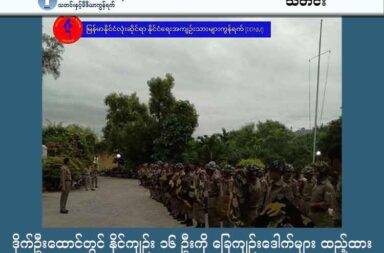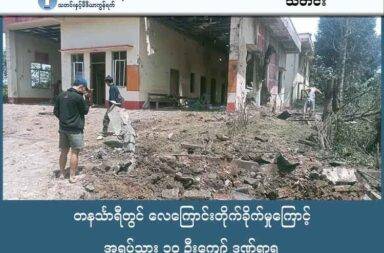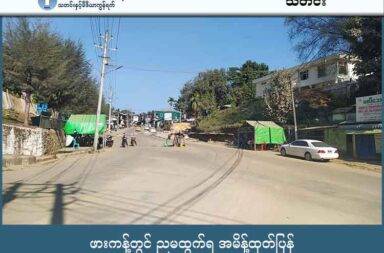Civil Society Calls on Tatmadaw, EAOs to Stop Abuses in Shan State
‘Many people have been arrested. Some people have disappeared,’ a leader from the Ta’ang Women’s Organization said.
By NETWORK MEDIA GROUP (NMG)
Tuesday, March 12, 2019
Civil society organizations in northern Shan State have demanded that both the Burma Army and ethnic armed organizations (EAOs) stop committing human rights abuses in the region’s conflict areas.
The groups say that locals in Hsipaw, Namtu, Kyaukme, and Kutkai townships are suffering from ongoing tension and clashes.
“Many people have been arrested. Some people have disappeared,” said Lway Poe Kamay Chop, the general secretary of the Lashio-based Ta’ang Women’s Organization (TWO), calling for all those who have been detained by various groups to be released.
She alleges that the Restoration Council of Shan State/Shan State Army (RCSS/SSA) abducted men from the village of Mangli, and that forces from the Kachin Indpendence Army had recently detained workers in a sugar cane field in Kutkai. Lway Poe Kamay Chop went on to accuse the Ta’ang National Liberation Army (TNLA) of arresting people for drug-related issues, but that they had promised to release them.
TWO, along with the Ta’ang Students and Youth Union released a joint statement on March 7 calling for 12 villagers from the community of Mangli to be released, and claiming that they had evidence that they were being held by the RCSS/SSA. The Ta’ang Law Support Group also asked that the men be freed, and that to keep them in custody would be a violation of the Geneva Convention.
Sai Naw Seng from the Tai Youth Network echoed broad calls for the release of detainees.
“We demand all armed organizations, including the Burma Army and EAOs, not arrest people because of doubts. Our people have been suffering a lot,” he said. “Regarding armed conflict in northern Shan State, these problems are still unsolved today… We locals don’t understand what they want, what they are fighting for.”
In addition to abductions, clashes near villages are a major concern, as are landmines, civil society representatives said. They also blamed the Burmese government for its failure to take responsibility in resolving the current problems and addressing the legacy of long-standing conflict in Shan State.
From the Burma Army, Lway Poe Kamay Chop demanded that they adhere to the four-month unilateral ceasefire they declared in December of last year, promising to halt military operations in five command regions, including northern Shan State.
“In practice there are clashes at the ground level. We want to demand that this not happen again,” she said. In an appeal to EAOs, she asked that they “stop armed conflict as fast as they can,” citing the suffering, displacement, and trauma experienced by their people.
“We want all stakeholders to solve these problems at the table. They need to talk,” the TWO general secretary said.
This week, an offensive by government forces against the Shan State Progress Party/Shan State Army (SSPP/SSA) has led to the displacement of 500 civilians in Kesi Township.
Clashes between the RCSS/SSA and joint forces belonging to the SSPP/SSA and the TNLA have displaced more than 2,400 people in Hsipaw Township.


